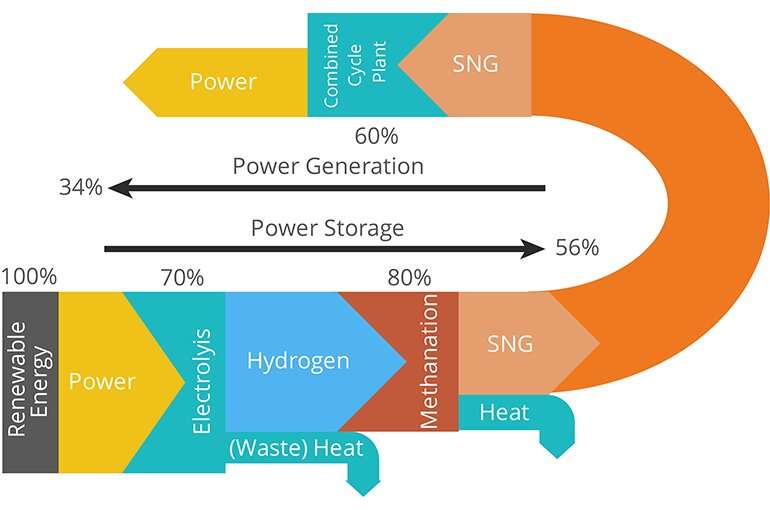Methane promising route for storage of renewable energy from sun and wind

Storing renewable electricity in molecules can solve two problems at once: first of all environmentally harmful CO2 can be used as a feedstock, and secondly it can enhance the capacity to store renewable electricity in chemical bonds for long periods of time. The latter is necessary because traditional batteries do not yet have the capacity to ensure enough flexibility, stability and security to store wind and solar energy on a large scale for extended time periods. Utrecht University researchers published a Perspective article on the status quo of "power to methane" earlier this month in Nature Catalysis.
First author Charlotte Vogt says, "Aside from understanding fundamental physical and chemical concepts behind catalytic reactions, I'm especially interested to know if and how the research I am doing can impact society. That's why I wanted to start this societally relevant, but still fundamental research project."
Ten times cheaper
Another process that can be used to store electricity in molecules is the conversion of water to hydrogen via electrolysis. This process is cheaper than methanation, because it involves fewer reaction steps. The researchers have now calculated that despite this higher cost of the process, it can still be beneficial to make methane out of CO2 because storage of methane is ten times cheaper than hydrogen. This way, we can store electricity for seasons in a potentially cheaper manner than by using only hydrogen.
"The important part of this idea is that we do not send the methane to houses, where it gets re-emitted as CO2, but rather to recycle this carbon again and again in a closed-loop process," says Vogt. "This process of using methane as a chemical battery has an overall efficiency of roughly 34%, so we need a lot of CO2 to ensure that our 'battery' gets big enough." Another option is to make methane out of sustainably resourced biomass or municipal waste. In this case, the methane could be sent to houses through our natural gas network. However, without a carbon tax this synthetic natural gas (SNG) will be more expensive than fossil methane, so it is unlikely that this process will come to fruition in the near future.
Promising research direction
The researchers thus conclude that 'Power to Methane' is indeed a promising research direction for certain geographical sweet spots in the world where there are many CO2emissions (near large scale industry for example, called point sources), together with the production of renewable electricity. Examples of such CO2 point sources are petrochemical and metallurgical industries, both present in the Netherlands. The researchers finally conclude that the future of non-fossil fuel dependent energy supply is mainly dependent on how fast we can make the conversion of water to hydrogen much cheaper, and in the long run directly convert water and CO2 into hydrocarbons, which we can directly use in the energy transportation grid, methane being an example of it.
The work involved a close collaboration between Prof. Gert Jan Kramer of the Copernicus Institute of Sustainable Development at Utrecht University, and Charlotte Vogt, Matteo Monai, and Prof. Bert Weckhuysen, who are chemists at the Inorganic Chemistry and Catalysis group of Utrecht University.
Bert Weckhuysen: "We have a responsibility as scientific researchers to be aware of the socioeconomical impact of our science, and catalytic chemistry in particular. By collaborating in this way, we utilize our combined knowledge to help determine what research and technology directions society should put emphasis on."
More information: Charlotte Vogt et al. The renaissance of the Sabatier reaction and its applications on Earth and in space, Nature Catalysis (2019). DOI: 10.1038/s41929-019-0244-4
Journal information: Nature Catalysis
Provided by Utrecht University Faculty of Science



















